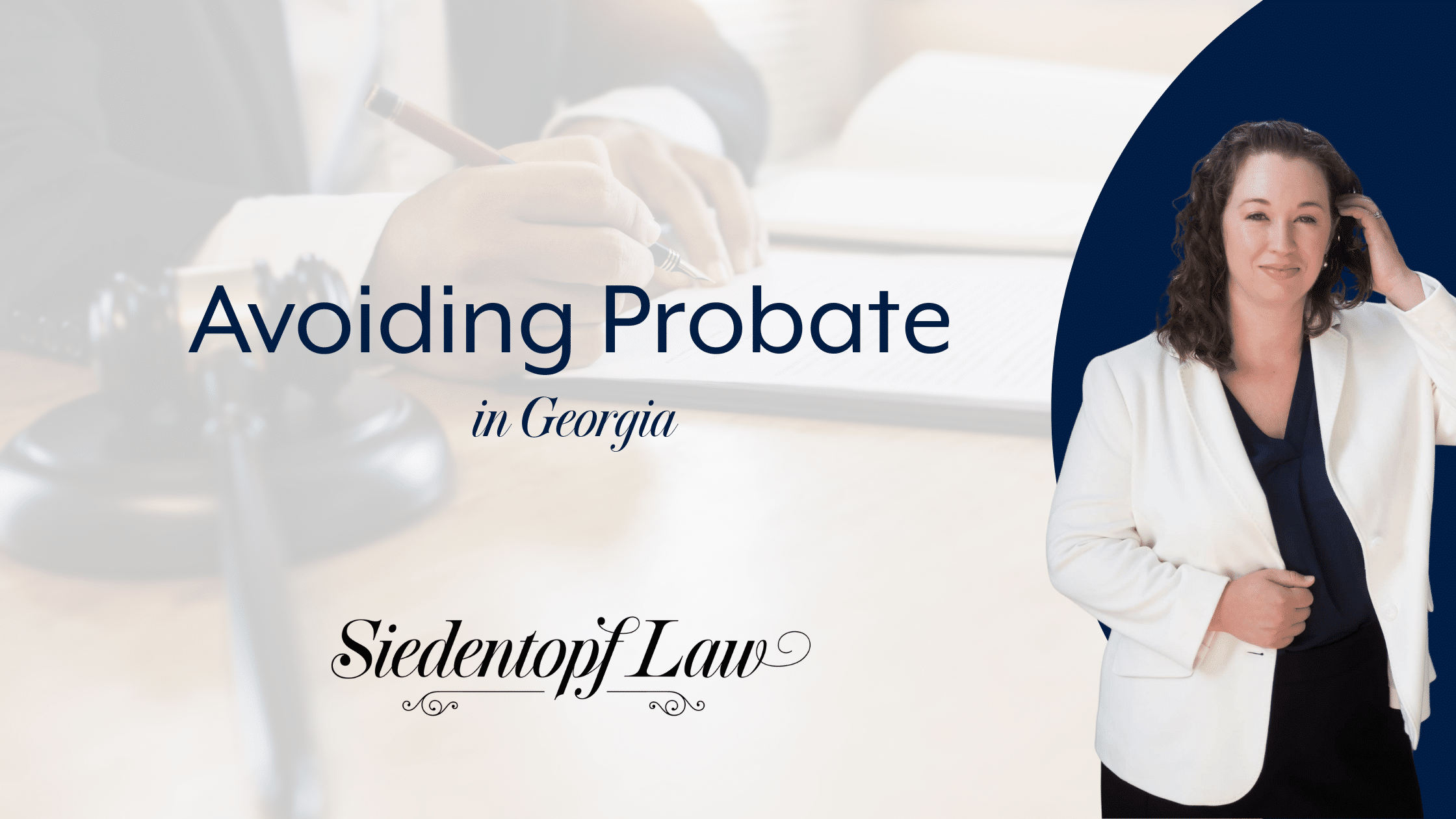Avoiding Probate in Georgia

Avoiding probate in Georgia is a major concern for many today. Some want to avoid it to cut fees and costs, while others understand the stress and time suck that the probate process can be to their loved ones.
Today we’re taking a closer look at a few of my favorite ways to avoid probate. If you know me, you’re familiar with how much I love trusts. Avoiding probate is one of the main reasons I love a Trust. But did you know that there are other tools to avoid probate? Read on to learn about them and how they are useful.
Why Would I Want to Avoid Probate?
Before I dive into the tools, I do want to provide some insight as to why you may want to avoid probate.
- Probate is a public process. Any element of your estate that goes through the probate process has to be filed with the Court—thus making that portion of your estate part of the public record. This means anyone who requests these public records and pays the associated fees for them will receive them. This may not be a big deal to some but is deeply concerning to others. Avoiding probate protects your privacy.
- Probate can be expensive. There are filing fees that have to paid to the Court. And if required by the Court, your estate may have to pay for appraisals of your assets. There can be significant attorney’s fees in any probate case—from the easiest to cases where there is no Will, or the Will is contested. This can be costly and reduce the amount of legacy that you pass on.
- Probate can be a major hassle and require a lot of time. It can be a major strain on your loved ones.
Avoiding probate is a strategy in estate planning, and with proper execution of estate planning tools it can be done.
Trusts
As I mentioned above, the most common tool to avoid the probate process is to employ the use of a Trust, or multiple Trusts, in your estate plan. Trusts are a legally binding contract that take effect at the time they are signed— not at your death. The trust transfers the ownership of your property and assets to the Trustee of the trust to be used as the trust outlines.
During your lifetime this likely means that you, acting as Trustee, have authority to use the assets and property within the Trust for your support and benefit. After your death, a successor Trustee, named within the Trust, takes over the duties and begins following the rules outlined for the successor Trustee. These rules pertain to the use and distribution of the Trust assets.
Keep in mind that Trusts avoid probate, but assets or properties of your estate that were not assigned to the Trust will likely have to go through probate. An example of this is a vehicle that is titled to you as person and not you the trustee of your trust. This vehicle would need to go through probate to be either placed into your trust or distributed as your will allows.
So, a Trust is an amazing tool to avoid probate, but it is very important to review your estate regularly to ensure all assets are in the Trust.
Beneficiary Designation
Another important tool to assist in avoiding probate is the beneficiary designation. This is when you have an account or an insurance policy where you name the beneficiaries you wish to receive the assets upon your death.
It is typical to designate a beneficiary for retirement accounts and life insurance policies. Another often overlooked account is your bank account. You can name a beneficiary to receive the funds in the accounts at the time of your death. This is often called a payable on death account.
When you employ the use of a beneficiary designation that says to that entity “this is exactly who I want to receive these assets upon my death.” These funds or assets do not go through the probate process. It is a very powerful, and easy tool to use.
The caution here is to check your designations often— we recommend yearly— to ensure that they are still accurate, each person designated is still available to receive the asset, and they reflect your current wishes.
Give Gifts Now
The last tool you can employ to avoid probate is to begin gifting assets or items now. The benefits here are potentially numerous.
The first benefit is that items, assets, or property no longer owned by you are not subject to probate.
The second benefit is that in the event that your estate would be assessed an estate tax, or your loved one assessed an inheritance tax, because the gift was given prior to your death these taxes no longer apply. Keep in mind that any gifts over the federal limit do trigger a gift tax— which you, the donor, are required to pay. But paying this gift tax may benefit you and your estate in the long run. We always recommend discussing the giving of large gifts with your tax expert and financial advisor.
The third benefit is the enjoyment of watching your loved one receive and benefit from the gift while you are here to see it.
Giving gifts now is not for everyone. But it is certainly a consideration if you are looking to avoid probate.
At Siedentopf law we love helping people just like you secure the largest legacy and most easily executed distribution of that legacy. Every estate is unique, and we treat each one as such. Let’s talk about avoiding probate in Georgia. Call us at (404) 736-6066 or visit our website to schedule a consultation.


